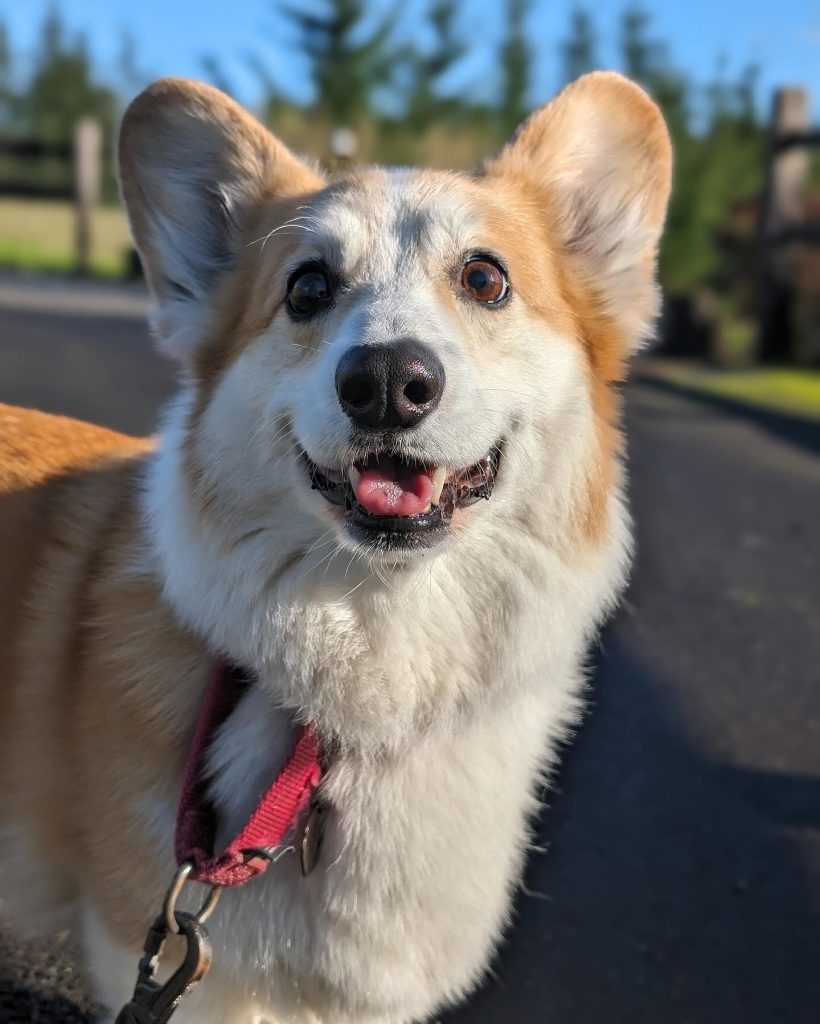Corgis, with their distinctive appearance and endearing personalities, have become one of the most beloved dog breeds around the world. These small but sturdy canines are known for their short legs, elongated bodies, and spirited dispositions. While they might be small in stature, Corgis possess a large presence, often surprising those unfamiliar with the breed with their robust energy and strong work ethic. This introductory section aims to shed light on the essence of the Corgi breed, providing insights into their physical characteristics, temperament, and the role they’ve played throughout history.

An Overview of the Corgi Breed
The Corgi breed encompasses two distinct types: the Pembroke Welsh Corgi and the Cardigan Welsh Corgi. While both share several traits, including their notable short stature and herding abilities, there are key differences that set them apart. Pembroke Welsh Corgis are perhaps the more recognized of the two, known for their outgoing and affectionate nature, as well as their docked tails. On the other hand, Cardigan Welsh Corgis, distinguished by their long tails and larger frame, exhibit a more reserved demeanor. Both types, however, are celebrated for their intelligence, agility, and loyalty, making them excellent companions and working dogs.
The Historical Background of Corgis
Corgis boast a rich heritage that traces back to the rugged landscapes of Wales, where they were originally bred as herding dogs. Their compact size allowed them to effectively nip at the heels of larger livestock, such as cattle and sheep, while avoiding kicks. The breed’s name itself, “Corgi,” is derived from the Welsh words “cor” and “gi,” translating to “dwarf dog” in English. Beyond their herding duties, Corgis have been entwined with Welsh folklore, which whimsically suggests that these dogs were once the steeds of fairy warriors. This mythological association adds a layer of enchantment to the breed’s history, further endearing them to dog enthusiasts and culture aficionados alike.
Personality and Temperament of Corgis
Delving into the personality and temperament of Corgis reveals a complex tapestry of traits that make these small canines both a joy and a challenge to their owners. Renowned for their spirited and affectionate natures, Corgis also bring a mix of intelligence, stubbornness, and playfulness to the table, making every day with them an adventure. This section explores the multifaceted character of Corgis, their need for activity, and the journey of training these captivating creatures.
Character Traits: The Corgi Disposition
Corgis are much more than just their cute appearances; they are packed with personality traits that make them standout companions:
- Intelligence: Corgis are incredibly smart, which makes them quick learners but also means they can be quite willful.
- Loyalty: They are fiercely loyal to their families, often forming a strong bond with all members but sometimes becoming especially attached to one person.
- Sociability: Corgis generally enjoy the company of people and other dogs, though they can be reserved or cautious around strangers.
- Playfulness: A playful and fun-loving nature is a hallmark of the breed, with Corgis often maintaining a puppy-like demeanor well into adulthood.
- Protectiveness: Their herding background gives them a natural protective instinct, making them excellent watchdogs.
- Stubbornness: This trait can be one of the more challenging aspects of their personality, often requiring creative problem-solving in training.
Corgis and Their Activity Levels
Despite their compact size, Corgis are energetic and thrive on regular exercise and mental stimulation. Originally bred for herding, they possess a natural drive to be active and engaged. Daily walks, play sessions, and training activities are essential for keeping a Corgi healthy and satisfied. Without adequate physical and mental exercise, they may resort to undesirable behaviors out of boredom.
Training Corgis: Are They Easy to Train?
The journey of corgi training is one filled with rewards and challenges. Their intelligence means they can learn a wide variety of commands and tricks, from basic obedience to more complex tasks. However, their independent nature can sometimes lead to stubbornness, making consistency and patience key components in how to train your corgi. Positive reinforcement methods, such as treats and praise, are highly effective in training a corgi puppy and adult alike. Early socialization and consistent, engaging training sessions are crucial in molding a well-behaved and adaptable Corgi.

The Unique Temperament of Corgis
Corgis possess a temperament that is both delightful and demanding, reflecting their herding heritage and spirited nature. This section delves into the nuances of Corgi behavior, from their vocal communication to their emotional needs and interactions within family environments. Understanding these aspects is crucial for anyone considering raising a corgi or bringing a corgi puppy into their home.
The Soundscape of Corgi Life: Barking Tendencies
Corgis are communicative animals, often using their voice to express themselves. This can range from alerting their owners to strangers approaching their home to vocalizing their demands or desires. While their barking can serve as a good deterrent for unwanted visitors, it can sometimes become excessive. Managing this behavior involves understanding the triggers, which can include boredom, seeking attention, or reacting to external stimuli. Training, coupled with providing sufficient mental and physical stimulation, can help mitigate unwarranted barking.
Separation Anxiety in Corgis
Raising a corgi comes with its set of challenges, one of which is their predisposition to separation anxiety. This breed forms strong attachments to their owners, making them prone to stress when left alone for extended periods. Symptoms of separation anxiety can include destructive behavior, excessive barking, and restlessness. To mitigate these issues, it’s important to gradually acclimate a corgi puppy to being alone for short periods, ensuring they feel safe and comfortable. Providing engaging toys and creating a soothing environment can also help ease their anxiety.
Corgis in Family Settings: Their Relationship with Children
Corgis generally fare well in family settings, often becoming affectionate and protective companions for children. However, their herding instincts can sometimes manifest as nipping at heels, a behavior that stems from their historical role in cattle herding. Teaching children how to interact safely and respectfully with a corgi, and vice versa, is essential for harmonious cohabitation. Training can also curb the corgi’s stubborn tendencies, ensuring they understand the boundaries within family dynamics. Raising a corgi in a family environment requires a commitment to training, socialization, and understanding the breed’s unique personality traits.

Breed Traits and Care
Understanding the breed traits and care requirements of Corgis is essential for prospective and current owners alike. This section of the corgi breed guide delves into their social behaviors, grooming needs, exercise demands, and nutritional requirements, providing a comprehensive corgi breed review to ensure these dogs lead healthy, happy lives.
Affection and Sociability with Family and Pets
Corgis are renowned for their affectionate nature and sociability, traits that endear them to families and make them excellent companions. Their ability to form close bonds with family members is matched by a friendly disposition towards other pets, although their herding instincts may sometimes come into play. Socialization from a young age is crucial to fostering positive interactions, helping Corgis understand and respect the boundaries of both humans and other animals in their environment.
Grooming Needs: Shedding and Coat Care
Corgis are known for their thick, double-layered coats, which require regular maintenance to keep in top condition:
- Brushing: Regular brushing, at least once a week, is necessary to remove loose hair and prevent matting, especially during their bi-annual shedding seasons when they shed more heavily.
- Bathing: While Corgis don’t require frequent baths, a monthly bath can help keep their coat clean and reduce shedding.
- Nail Trimming: Regular nail trimming is important to prevent discomfort and potential health issues.
- Ear Cleaning: Keeping their ears clean and dry is essential to prevent infections, especially considering their floppy nature.
Adhering to these grooming practices not only keeps a Corgi looking their best but also contributes to their overall health and comfort.
The Importance of Regular Exercise
Despite their small stature, Corgis possess high energy levels that necessitate regular exercise to maintain their physical and mental well-being. Activities such as walking, playing fetch, and participating in canine sports can provide the stimulation they need. Exercise not only helps in managing their weight but also curbs potential behavioral issues arising from boredom or excess energy.
Nutritional Guidelines for a Healthy Corgi
Feeding a Corgi a balanced diet tailored to their specific needs is crucial for their health. Factors such as age, weight, and activity level should guide their nutritional regimen. High-quality dog food that meets the nutritional standards set by the Association of American Feed Control Officials (AAFCO) is recommended. Portion control is particularly important for Corgis, as their hearty appetites and predisposition to obesity necessitate careful management of their food intake. Consulting with a veterinarian can provide personalized dietary advice to ensure your Corgi maintains optimal health.

Health Considerations for Corgis
Ensuring the health and well-being of a Corgi involves being aware of the breed-specific health considerations and taking proactive steps to manage them. This section addresses common health issues in Corgis and outlines the recommended health screenings that are essential for early detection and management of potential health concerns.
Common Health Issues in Corgis
Corgis are generally healthy dogs, but like all breeds, they are susceptible to certain health conditions. Being aware of these common issues can help owners seek timely veterinary care:
- Hip Dysplasia: This is a genetic condition where the thighbone doesn’t fit snugly into the hip joint, which can lead to arthritis or lameness.
- Degenerative Myelopathy: A progressive disease of the spinal cord, leading to loss of mobility in the hind legs.
- Intervertebral Disc Disease: Due to their long backs, Corgis are prone to spinal issues that can cause pain, reduced mobility, or paralysis.
- Obesity: Corgis love to eat, making them prone to weight gain, which can exacerbate joint problems and lead to other health issues.
- Progressive Retinal Atrophy (PRA): An eye disorder that eventually leads to blindness from the loss of photoreceptors at the back of the eye.
Regular check-ups and maintaining a healthy lifestyle can help manage these conditions and ensure a Corgi leads a full, happy life.
Recommended Health Screenings
To safeguard the health of Corgis, certain health screenings are recommended:
- Hip Evaluation: To check for signs of hip dysplasia.
- Ophthalmologist Evaluation: To screen for inherited eye diseases like PRA.
- DNA Tests: For identifying genetic conditions such as Degenerative Myelopathy.
These screenings are invaluable tools for early detection of potential health issues, allowing for prompt treatment and management. Engaging in regular veterinary care, tailored to the needs of the Corgi breed, is crucial for maintaining their health and well-being throughout their lives.

Practical Aspects of Welsh Corgi Ownership
Owning a Corgi is a rewarding experience that comes with specific responsibilities. Understanding and catering to their unique needs is essential for their well-being.
Understanding and Meeting the Needs of Your Corgi
Caring for a Corgi involves more than just providing food and shelter. It requires attention to their physical exercise, mental stimulation, and emotional bonding. Regular vet check-ups, a nutritious diet, daily exercise, and training are key components. Recognizing and respecting their herding instincts, social nature, and intelligence will help in fostering a fulfilling life for your Corgi.
Corgi Breed Standards: Colors and Markings
Corgis come in a variety of colors and markings, including red, sable, fawn, black and tan, with or without white markings. The Pembroke Welsh Corgi is often seen with a shorter tail, while the Cardigan Welsh Corgi features a full, long tail. Understanding the breed standards can be particularly important for show dogs but also adds to the appreciation of the breed’s diverse beauty for all owners.
Engaging with the Corgi Community
Becoming part of the Corgi community can enhance your experience as a Corgi owner, providing support, resources, and fun activities. Whether you’re looking to adopt, engage with clubs, or participate in events, there’s a vibrant community ready to welcome you and your Corgi.
Finding a Corgi: Adoption and Breeder Information
When looking to bring a Corgi into your home, consider both breeders and rescue organizations. Reputable breeders can provide health clearances for the puppies’ parents, ensuring you’re getting a healthy pet. Adoption from rescues or shelters is also a wonderful option, offering a home to Corgis in need.
National Clubs and Rescue Organizations
Joining a national club or connecting with rescue organizations can be incredibly rewarding:
- The Pembroke Welsh Corgi Club of America (PWCCA)
- The Cardigan Welsh Corgi National Rescue Trust
- Local Corgi-specific rescue groups
These organizations offer resources, adoption services, and opportunities to engage with other Corgi enthusiasts.
Participating in Dog Sports and Community Events
Corgis excel in various dog sports like agility, obedience, and herding trials. Participating in these events can be a great way to bond with your Corgi while also connecting with the broader Corgi and canine sports communities. Local dog clubs and online Corgi groups often host or have information on upcoming events, making it easy to get involved.
Conclusion: Is a Corgi the Right Companion for You?
Deciding if a Corgi is the right companion for you requires considering their unique traits, care needs, and your lifestyle. Their spirited nature, intelligence, and affection make them wonderful pets for those willing to engage with their active, sociable, and occasionally stubborn personalities.
